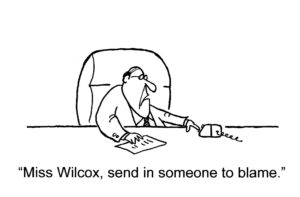



Accountability – let’s start doing it like we actually mean it (Part One)
The Lime Group | Articles


Ed Hurst – Senior Consultant
If you’re a leader in pretty much any large organization today, then chances are you are no stranger to dealing with public relations issues, compliance breaches, and the occasional brand-and-reputation-shriveling legal or ethical challenge. How often do you find yourself thinking or saying something like this?…
“I admit we did some unfortunate things. But we’re working at improving and most of what we do is awesome. It’s hard, when you’re as busy as we are, to control what everyone is doing. But we’re listening, and we’ll get better.”
In other words, your plan to address the issue can be summed up as…
“We’ll carry on pretty much as we always have, just do it with more accountability! Then everything will be alright.”
OK, so the phrasing is a little tongue-in-cheek, but doesn’t it sound rather familiar? However sincerely we regret our company’s mistakes, we’re flat out operating the business. We’re investing massive amounts of time and money to grow in line with our values. Sometimes, a few of our people go off-piste. We take it seriously but nobody’s perfect…
Fair enough. But think for a moment about what the quote above implies – that the solution is to keep working, keep trying, and keep listening with a liberal dash of ‘more accountability’ thrown in. Conventional wisdom has it that this is what it takes to deal with significant, usually long-standing, systemic patterns of behavior and decision-making that lead to potentially brand-destroying consequences.
 I am not a fan of conventional wisdom.
I am not a fan of conventional wisdom.
In my experience, the approach most organizations take when they want to develop a culture of accountability is to do a bunch of thinking and surveying, let a good amount of time pass while the data is being analyzed, then cascade initiatives top-to-bottom through the organization, aimed at defining/clarifying values and making people behave more in line with them. Logically, the initiatives ‘should’ work because they are typically data-backed and robust. The logic goes… If we define our values, that should help people to know how we want them to behave – especially if we appraise and reward everyone against those values, right? Telling people that we want them to speak up – that should help too, because openness can only make people more accountable. Training our leaders to create a positive risk culture – that surely has to make a difference? It all sounds great except for one thing.
It’s not working.
The very organizations pouring millions of dollars (not to mention massive buckets of their people’s time and energy) into these initiatives are often the same ones who keep suffering scandals and committing ethical faux pas. And, worse still, because leaders keep ‘talking a good game’ about accountability, without succeeding in enabling tangible change (either in organizational culture or outcomes), people have become cynical, desensitized and alienated from the whole thing. Not only is it not working, nobody really takes any of it seriously any more. So, we’re worse off than we would have been if we’d never spent all that time and money pushing accountability in the first place!
The problem with the approaches dictated by conventional wisdom is that accountability can’t be solved through top-down, mechanistic, analytical approaches – no matter how smart leadership is. And here’s why – have you ever looked up the dictionary definition of ‘accountable’? Here it is:
Accountable (adj.) required or expected to justify actions or decisions; responsible. Synonyms include: responsible, liable, answerable, chargeable, to blame
It’s a real toe-curler isn’t it? Who would want any part of that?!!
Simply put, accountability only happens if people feel genuinely empowered and personally committed to their part in achieving shared priorities. And we’re trying to make that happen by imposing it? Did we have our brains switched on when we came up with that idea?
It’s basically impossible to hold people accountable by force to anything but the lowest‑common‑denominator of performance. Organizations only achieve a functional culture of accountability if their people want to hold themselves accountable to high standards and results. That’s a tough thing to engender from a leader’s chair.
It’s time to do something different.
And it’s not a matter of coming up with the next smart, logical process. Accountability that leads to materially different (better) decisions and business results depends on engaging the organization fully – ‘heads, hearts and hands’. In addition to the usual performance-target-oriented solutions, we need to connect with how our people feel and what drives their decisions. As leaders, we need to design and enable implementation of new ways of working that shift the daily rhythms of business on the ground. And each person needs to feel like they are all doing it for their own reasons because we believe individually – and together – in what our organization is there to do.
So, what might help? In the next instalment of this multi-part blog, I’ll share some of the approaches that we’ve found can truly advance accountability… They all depend on one important theme – true accountability is not owned or controlled by us as leaders. Our role is to inspire, challenge and support everyone to do it for themselves – in a variety of highly practical ways, in line with what our organizations exist to do in the first place.
In the meantime, if you have experiences and insights of accountability – good or bad – I’d love to hear about them. Feel free to drop me a line on ed.hurst@thelimegroup.com.